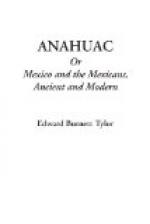A few hours riding down the steep descent, and we were in the flat plain of Puebla. There were our two mountains behind us, but now they looked as we had so often seen them before from a distance. The power of realizing their size was gone, and with it most of their grandeur and beauty. Nothing was left us but a vivid recollection of the wonderful scenes that were before us a few hours ago, impressions not likely to be ever effaced from our minds, where the picture of the great snowy cone seen in the bright moonlight, and the descent between the mountains, remain indelibly impressed as the types of all that is most grand and impressive in the scenery of lofty mountains.
We slept at San Nicolas de los Ranches, “St. Nicholas of the huts,” where the shopkeeper, to whom we had a letter, insisted upon turning out of his own room for us, and treated us like princes. The reason of our often being provided with letters to the shopkeepers in small places, was, that they are the only people who have houses fit for entertaining travellers. Many of them are very rich, and in the United States they would call themselves merchants. Next morning our Indian carrier, who had ascended the mountain without a veil, was brought in by our guide, a pitiful object. All the skin of his face was peeling off, and his eyes were frightfully inflamed, so that he was all but blind, and had to be led about. Fortunately, this blindness only lasts for a time, and no doubt he got well in a few days.
We rode through the plain to Cholula. Our number was now four; for, besides Antonio, we had engaged another servant a few days before. We wanted some one who knew this district well; and when a friend of ours mentioned that there was a young man to be had who had a good horse and was a smuggler by profession, we engaged him directly, and he proved a great acquisition. Of course, from the nature of his trade, he knew every bypath between Mexico and the tobacco-districts towards which we were going; he was always ready with an expedient whenever there was a difficulty, he was never tired and never out of temper. As for the morality of his peculiar profession, it probably does harm to the honesty of the people; but, considering it as a question of abstract justice, we must remember that almost the whole of the taxes which the Mexicans are compelled to pay to the general government are utterly




